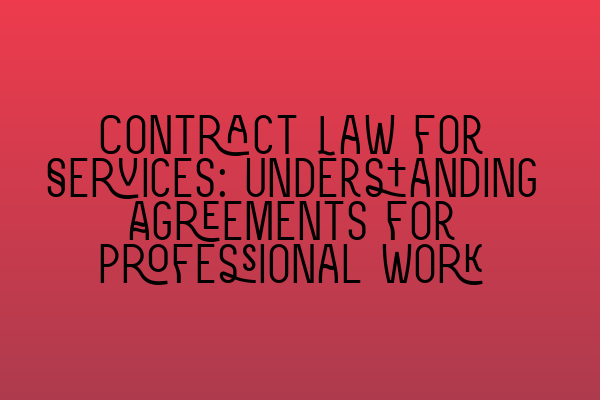Contract Law for Services: Understanding Agreements for Professional Work
When it comes to professional services, having a clear and comprehensive contract is essential. A well-drafted contract not only protects your interests but also ensures that both parties fully understand their rights and obligations. In this article, we will dive into the intricacies of contract law for services, exploring key concepts and provisions that should be included in your agreement.
1. The Importance of a Clear Scope of Work
One of the first things you need to establish in a contract for professional services is a clear and detailed scope of work. This defines the specific tasks and deliverables that are expected from the service provider. The scope of work should leave no room for interpretation or ambiguity, laying out specific timelines, milestones, and performance standards.
Related Article: SQE 1 Practice Exam Questions
A well-defined scope of work is beneficial for both parties involved. It ensures that the service provider knows exactly what is expected of them and helps the client in assessing the adequacy of the services provided. In case of any disputes or disagreements, a clear scope of work can serve as a reference point to resolve issues efficiently.
2. Essential Elements of a Contract for Services
A contract for services should contain several key elements to ensure its enforceability and effectiveness. These elements include:
- Offer and acceptance: Clearly state the offer made by the service provider and the client’s acceptance of that offer.
- Consideration: Specify the payment terms and any other benefits or compensation provided in exchange for the services rendered.
- Terms and conditions: Outline the specific terms and conditions that govern the agreement, including any limitations, warranties, or guarantees.
- Intellectual property: Address the ownership and use of intellectual property rights, ensuring that both parties’ rights and interests are protected.
- Confidentiality: Establish provisions to protect sensitive and confidential information shared during the course of the engagement.
- Termination: Define the circumstances under which either party can terminate the contract and the associated procedures.
- Dispute resolution: Include a provision for resolving disputes, such as through mediation, arbitration, or litigation.
By incorporating these essential elements into your contract, you can create a robust agreement that addresses all necessary aspects of the professional engagement.
3. Addressing Potential Risks and Liabilities
Another crucial aspect of contract law for services is identifying and addressing potential risks and liabilities. Professional services carry inherent risks, and it is essential to anticipate and manage these risks to protect both parties.
Related Article: SQE 1 Practice Mocks FLK1 FLK2
The contract should clearly define the standard of care expected from the service provider and outline any limitations of liability. It is essential to address issues such as negligence, non-performance, delays, or breaches of confidentiality. By clearly establishing responsibilities and liabilities, you can minimize the potential for disputes and facilitate effective resolution in case of any issues.
4. Amendments and Modifications
Contracts for professional services may need to be modified or amended over time due to changing circumstances. It is crucial to include provisions that outline the process for making amendments and modifications to the contract. This protects the interests of both parties and prevents any misunderstandings or disputes arising from changes made to the original agreement.
Related Articles: SQE 2 Preparation Courses | SQE 1 Preparation Courses | SRA SQE Exam Dates
Additionally, any amendments or modifications should be agreed upon in writing and signed by both parties. This ensures the clarity and enforceability of any changes made to the original contract.
5. Seek Legal Advice
Contract law can be complex and varies depending on the jurisdiction. It is always advisable to seek legal advice when drafting or reviewing contracts for professional services. A solicitor specializing in contract law can provide valuable insights, ensure compliance with applicable laws, and help protect your rights and interests.
Having a well-drafted contract is crucial for any professional engagement. By incorporating the concepts and provisions discussed in this article, you can create a robust and comprehensive contract that protects your interests and ensures a successful working relationship.
